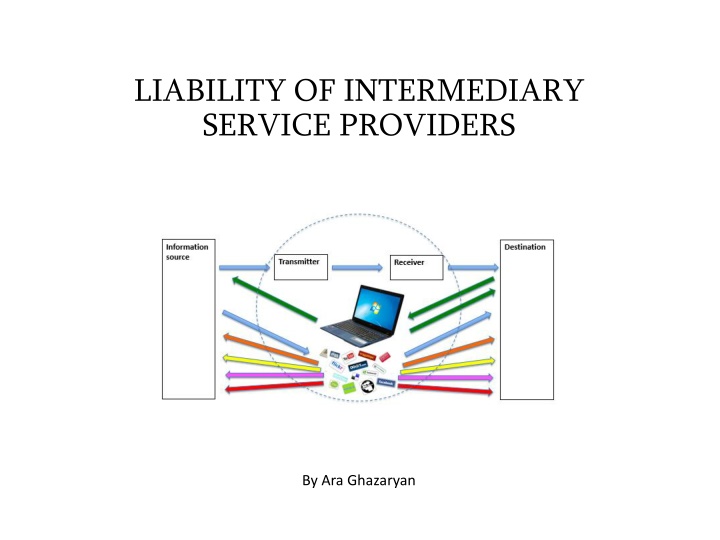
Liability of Intermediary Service Providers in E-Commerce Directives
Understand the role of intermediaries like Internet service providers, news agencies, and online platforms in facilitating information transmission. Explore the legal liability exemptions outlined in the EU E-Commerce Directive 2000/31/EC for service providers regarding unlawful content. Discover the nuances of hosting and the notice-and-takedown defense for information stored on behalf of users.
Download Presentation

Please find below an Image/Link to download the presentation.
The content on the website is provided AS IS for your information and personal use only. It may not be sold, licensed, or shared on other websites without obtaining consent from the author. If you encounter any issues during the download, it is possible that the publisher has removed the file from their server.
You are allowed to download the files provided on this website for personal or commercial use, subject to the condition that they are used lawfully. All files are the property of their respective owners.
The content on the website is provided AS IS for your information and personal use only. It may not be sold, licensed, or shared on other websites without obtaining consent from the author.
E N D
Presentation Transcript
LIABILITY OF INTERMEDIARY SERVICE PROVIDERS By Ara Ghazaryan
Who are the intermediaries ? Who are the intermediaries ? Internet service providers (ISP) Comcast Xfinity offers cable Internet service across 40 states to approximately 110 million people. AT&T Internet Offers high speed Internet service to 22 states. News agencies www.bbc.com www.cnn.com News aggregators Social networks
Intermediaries ? Intermediaries ? Commercial services www.ebay.com www.ebay.com www.cheaptickets.com www.cheaptickets.com Libraries/archives/court decisions User generated content sites Create X-files WikiLeaks
Intermediaries Intermediaries They provide interactive online services They are medium of information They are carrier of information They provide portal for posting of information Mere conduit of information They do not produce content, they simply act as a medium of information, or information conduit SHOULD THEY BE LEGALLY LIABLE FOR UNLAWFUL CONTENT PRODUCED BY OTHERS!!
EU E EU E- -Commerce Directive 2000/31/EC Commerce Directive 2000/31/EC (42) The exemptions from liability cover only cases where the activity of the service provider is limited to the technical process of operating and giving access to a communication network over available by third parties is transmitted or temporarily stored, for the sole purpose of making the transmission more efficient; this activity is of a mere technical, automatic and passive nature, which implies that the service provider has neither knowledge of nor control over the information which is transmitted or stored. which information made http://eur-lex.europa.eu/legal- content/EN/TXT/PDF/?uri=CELEX:32000L0031&from=EN
EU E EU E- -Commerce Directive 2000/31/EC Commerce Directive 2000/31/EC Article 14 Hosting 1. service provider is not liable for the information stored at the request of a recipient of the service, on condition that: (a) the provider does not have actual knowledge of illegal activity or information and, as regards claims for damages, is not aware of facts or circumstances from which the illegal activity or information is apparent; or (b) the provider, upon obtaining such knowledge or awareness, acts expeditiously to remove or to disable access to the information. Notice and take down defense see Delfi AS case
EU E EU E- -Commerce Directive 2000/31/EC Commerce Directive 2000/31/EC (43) A service provider can benefit from the exemptions for mere conduit and for caching when he is in no way involved with the information transmitted; this requires among other things that he does not modify the information that he transmits; this requirement manipulations of a technical nature which take place in the course of the transmission as they do not alter the integrity of the information contained in the transmission. does not cover
EU E EU E- -Commerce Directive 2000/31/EC Commerce Directive 2000/31/EC Article 15 No general obligation to monitor 1. Member States shall not impose a general obligation on providers to monitor the information which they transmit or store, nor a general obligation actively to seek facts or circumstances indicating illegal activity.
United States United States Section 230 of the Communications Decency Act No provider or user of an interactive computer service shall be treated as the publisher or speaker of any information provided by another provider . information content To claim immunity, interactive service provider: a. must be Provider or user" of "interactive computer service. b. Must not be the producer (author) of the unlawful content
US absolute protection from liability No provider or user of an interactive computer service shall be treated as the publisher or speaker of any information provided by another information content provider . EU limited protection from liability Knowledge Control The ground for Notice and Take Down defense
